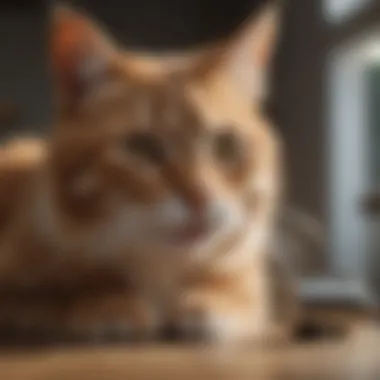Understanding the Financial Aspects of Cat Euthanasia


Intro
Deciding to euthanize a beloved cat is a profoundly emotional experience, and it often comes with a complicated blend of heartache and financial considerations. For pet owners, particularly those new to this difficult process, the tangled web of costs can add an extra layer of stress during a time that is already laden with sorrow. Understanding these financial implications is essential when navigating the decision, and it provides a necessary lens through which to view the situation holistically.
When contemplating euthanasia, several factors influence how much it may cost—a different veterinary practices, local location, and even what aftercare options one might choose. Pet owners should arm themselves with knowledge about the potential expenses involved. Such understanding does not only help in financial planning but also fosters a thoughtful approach to this sensitive subject, perhaps alleviating some of the burden during an emotional time.
Intro to Euthanasia for Cats
Euthanasia for cats is a subject that weighs heavily on every pet owner’s heart. Understanding this complex issue is crucial, as it encompasses emotional, ethical, and financial dimensions. Unlike some other decisions regarding pet care, euthanasia emerges from a place of profound love and compassion, often in response to suffering or terminal illness. Thus, it demands careful consideration not just from a financial perspective, but also from an emotional standpoint. By examining the multifaceted nature of cat euthanasia, this article aims to equip owners with the insights they need to make informed choices.
Defining Euthanasia
Euthanasia is a procedure used to humanely end the life of an animal that is suffering or in decline. The term itself derives from Greek, meaning "good death." It is performed by a veterinarian through the administration of medications that ensure a tranquil passing, minimizing suffering. This procedure is often surrounded by a sense of relief for the pet and the owner as it puts an end to prolonged pain. Understanding the medical and ethical implications of euthanasia is essential, as it helps pet owners navigate their options compassionately.
Reasons for Considering Euthanasia
Choosing euthanasia for a cat is never an easy decision. There are several key reasons that typically lead to this consideration:
- Terminal Illness: Cats diagnosed with serious or terminal health issues, like cancer or severe organ failure, may experience extensive suffering.
- Quality of Life: If an owner observes that their cat has lost its will to play, eat, or interact positively, it may be a signal that quality of life is severely diminished.
- Chronic Pain: Conditions like arthritis can cause persistent pain, and if treatments fail to alleviate this discomfort, euthanasia might be seen as a viable option.
- Behavioral Problems: Sometimes, severe behavioral issues stem from mental health conditions that lead to aggression or continuous distress, making it difficult for the cat to coexist peacefully with family members or other animals.
"Euthanasia often becomes an act of love, ensuring that a beloved pet does not endure unnecessary suffering."
In summation, each of these reasons underscores the importance of assessing both the pet's current state and its future prognosis. Euthanasia can bring peace not just to the pet, but also to the family honoring its memory. This part of the article sets the stage for deeper exploration into the financial implications of this difficult choice.
Factors Affecting the Cost of Euthanasia
Euthanasia, while a deeply emotional decision for pet owners, also bears significant financial implications. Understanding what drives these costs can help to ease some of the burdens faced during such a difficult time. Various factors intertwine to determine the overall expenses related to euthanasia, encompassing veterinary fees, the location of the procedure, and the type of clinic. Grasping these elements can profoundly assist in preparing for the path ahead, giving pet owners a clearer picture of potential financial responsibilities.
Veterinary Fees
At the forefront are the veterinary fees. These are not one-size-fits-all numbers; they vary widely across different practices and regions. Factors like the vet's experience and the specific services they provide can lead to varying charges. For instance, some clinics might offer a straightforward euthanasia package that includes the procedure and a follow-up consultation, while others may charge separately for each component.
As an example, an established veterinary clinic might charge around $150 to $300 for euthanasia, while others operating in less populated areas may list a price of $50 to $100. It’s advisable to inquire about these fees upfront, ensuring there are no surprises waiting in the wings when the time comes.
Location of the Procedure
The geographical location of the procedure significantly influences cost dynamics as well. Urban settings often present higher prices compared to rural areas where competition may drive costs down. For instance, a pet owner in Chicago will likely face higher charges than a counterpart in a smaller town.
Moreover, local legislation and the cost of living in an area can affect pricing as well. Knowing the landscape can help pet owners make informed decisions when selecting a clinic. It's worth the effort to do a bit of homework on what’s average in your locality before committing.
Type of Clinic
Not all veterinary clinics are created equal; the type of clinic also shines a light on fluctuating costs. Veterinary hospitals may offer advanced services and have the infrastructure for emergencies, but this may come at a premium. In contrast, animal shelters or nonprofit organizations may provide euthanasia services at lower rates, appealing to budget-conscious pet owners.
Additionally, mobile veterinary services are becoming increasingly popular. These professionals will come to your home, adding convenience to the mix. This service, however, might carry an extra charge for travel and inclusivity of the procedure. It’s essential to weigh these options according to not just financial capacities, but emotional comfort as well.


"Being informed about costs will alleviate some of the stress during an already trying time.“
In summary, navigating the costs associated with euthanasia requires consideration of multiple facets. Each element in the equation—veterinary fees, location, and clinic type—can alter financial expectations significantly. By approaching this topic with an informed mindset, pet owners can move forward with an understanding that will soften the emotional impact of their decisions.
Typical Cost Range
Understanding the typical cost range associated with cat euthanasia is crucial for pet owners who find themselves navigating this difficult period. Financial considerations can often add to the emotional burden of saying goodbye to a beloved pet. By having a grasp on the potential expenses involved, one can alleviate some of the stress that accompanies these final decisions. There are several factors that influence costs, making it wise to be well-informed about the range one might expect.
Average Cost Breakdown
The average cost of euthanasia for a cat typically falls between $50 to $300, heavily influenced by various factors. Here's a breakdown of what might be included in this range:
- Veterinary fees: This can encompass the consultation fee, which might be around $50 to $100. Some clinics might charge more if it’s after hours or on weekends.
- Procedure costs: The act of euthanasia itself can cost between $50 to $250, depending on the method and location.
- Aftercare options: Most owners also need to consider how they want to handle their pet's remains. Burial services can add an extra $50 to $200, while cremation can range up to $300 or more.
In most cases, it’s advisable to ask the vet for a detailed estimate before proceeding with the procedure. This way, unexpected costs can be avoided, making the process smoother.
Emergency Procedures vs. Routine Cases
When it comes to the final journey of a cat, timing plays a substantial role in costs. Emergency euthanasia — which occurs when a pet is in acute distress and immediate action is necessary — often carries a heftier price tag compared to routine cases, which can be scheduled during regular office hours.
- Emergency euthanasia can see costs soaring between $150 to $500. This is largely due to the premium charges for after-hours service and additional veterinary interventions.
- Routine cases, typically handled during normal business hours, often fall into the lower end of the spectrum, averaging between $50 to $150.
It's important for pet owners to have candid discussions with their veterinarians. Not only can this clarify potential costs, but it can also ensure that decisions are made soberly, considering the quality of life for the cat involved.
"Being prepared for the emotional and financial implications of euthanasia can lessen the weight of the decision and help owners focus on what truly matters — their cat's comfort and dignity."
By understanding these cost ranges and their influencing factors, pet owners are better equipped to make informed decisions when faced with the difficult choice of euthanasia.
Aftercare Costs
The aftercare costs linked to euthanasia are just as significant as the procedure itself. After a beloved pet is euthanized, many owners find themselves questioning what comes next. It's an emotional time, and the decisions made regarding aftercare can vary greatly based on personal preferences, cultural beliefs, and financial considerations. This section provides insight into various options available for aftercare, focusing on the practical and emotional implications.
Burial Options
Choosing to bury a cat after euthanasia brings forth various routes one might take. Some may prefer to conduct a home burial, which can evoke a sense of closeness, allowing one to honor their pet in a familiar environment. However, it’s crucial to check local laws since not all areas permit home burials. Use biodegradable materials for a more environmentally friendly approach, for example – a shroud made of natural fabric can suffice.
If a home burial isn’t feasible, consider a pet cemetery. This option typically provides a dedicated plot and can also offer additional services like grave markers or memorial services. While more costly than home burials, a cemetery can provide a peaceful resting place for a pet, ensuring the area is appropriately maintained.
"The loss of a pet can leave a profound emptiness, but creating a final resting place can provide solace, a physical location to reflect and remember."
Cremation Services
Cremation offers another avenue for aftercare that many pet owners consider. There are two main types: individual cremation and communal cremation. Individual cremation means your pet is cremated alone, allowing for the return of the ashes. This can provide a tangible connection to the pet, making it a popular choice for grieving owners.
On the other hand, communal cremation does not offer the option to retain ashes as pets are cremated together. This option is generally less expensive, but for many, the lack of physical remains can feel unsettling.


Prices can vary significantly based on the facility and services provided. Some offer packages that include transport, urns, and memorial services, which can bring up the total cost. Consulting the veterinary clinic about their affiliated cremation services is often a good starting point.
Memorialization Choices
Once the initial aftercare decisions are settled, many pet owners consider memorialization. This can take many forms, ranging from simple to elaborate. For instance, creating a small dedicated space at home with photographs, mementos, or even a paw print can be a gentle reminder of a pet’s life. Some owners find comfort in planting a tree or a flower garden as a living tribute.
For those seeking a more formal tribute, many companies specialize in pet memorial products. This includes custom-made urns, engraved plaques, or even jewelry incorporating the pet’s ashes. Additionally, there are pet memorial services that host ceremonies or provide support for owners during their grieving process.
Financial Considerations
The financial aspect of euthanasia for cats often weighs heavily on pet owners facing such a challenging decision. Understanding what you might be putting on the table can ease some of the stress when that moment arrives. Factors like the veterinary fees, location, and different aftercare options all play into this complex equation. And let’s face it, knowing the landscape in advance can save you from any unwelcome surprises. Navigating these waters might not be simple, but it is essential.
Budgeting for Euthanasia
Budgeting for euthanasia is more about the emotional burden than merely the dollars and cents. Pet ownership often comes with unexpected expenses, and preparing for the end of a beloved cat's life shouldn't be one more shock to your system.
Here are some elements to consider when budgeting:
- Veterinary Charges: First and foremost, research the typical costs at local veterinary clinics. Fees may differ based on if you're visiting your regular vet or a specialty clinic. Not all locations will charge the same, and you might find a range from intimate family practices to larger animal hospitals.
- Aftercare Choices: If you plan to have the remains handled with dignity, there's no shortage of options. From burial services to cremation, aftercare can add to the overall cost. You might want to set aside funds based on which option suits your family’s needs.
- Contingency Fund: It’s well-known that life's unpredictable. Setting aside a small cushion can cover anything from unexpected charges to additional aftercare services.
In the end, a little foresight can go a long way in managing costs associated with euthanasia.
Insurance Implications
It's worth noting that pet insurance can play a significant role in easing the financial blow. However, the nuances of coverage can be anything but clear-cut. Most pet insurance policies do not cover euthanasia, as these policies often focus more on treatments that could prolong life. That said, a few insurance plans do offer some form of reimbursement under specific conditions. Here’s what to keep in mind:
- Check Your Plan: Always read the fine print. Some policies might provide coverage for end-of-life expenses if deemed medically necessary by a veterinarian.
- Talk to Your Insurer: Engage in open discussion with your insurance provider. They can clarify what options your specific plan offers and if there are any stipulations you should be aware of.
- Budgeting with Insurance in Mind: If you do have a plan that provides some form of compensation, it might alter the way you budget for euthanasia. Your out-of-pocket might be less than expected, but always prepare for other costs that your plan won’t cover.
Adopting this pragmatic approach—balancing emotional depth with sound financial planning—can lead to a more peaceable experience during an extraordinarily tough time. Ultimately, having clarity in these financial considerations serves to ease the mind and allow focus on what truly matters—your beloved pet.
Emotional and Ethical Considerations
Euthanasia, especially for beloved pets like cats, brings to the surface a multitude of emotional and ethical dilemmas. Understanding these aspects is crucial for pet owners facing the heart-wrenching decision to end their pet's suffering. It’s not merely about cost or logistics; it’s about compassion, love, and the connections we share with our furry companions. Moreover, recognizing the emotional landscape is vital for navigating this difficult journey with sensitivity.
Understanding Grief
Grief can be a shadowy figure, appearing when least expected. For many pet owners, the grief associated with cat euthanasia can feel overwhelming. Each individual processes loss differently. Some might find themself immersed in sadness, while others experience anger or confusion. It’s essential to acknowledge this grief and understand that these feelings are entirely natural.
Some common facets of grief after euthanasia include:
- Loss of Companionship: Cats often provide unwavering companionship, and losing that presence can create a void in daily life.
- Guilt and Regret: Questions may arise about whether the decision was correct or if there was a possibility to prolong the cat's life.
- Changing Dynamics: For those living in a household with other pets, the dynamics can shift significantly following the loss.
Engaging in conversations with friends, family, or even support groups can aid in navigating through this tough emotional terrain. It is important not to shy away from these feelings; instead, embracing them can foster healing.
Discussing Options with Veterinarians


When it comes to euthanasia, open communication with veterinarians is paramount. These professionals serve as not only medical guides but also emotional support during this turbulent time. They can offer valuable insights into the feline condition and help determine whether euthanasia is indeed the best option.
In conversations with veterinarians, consider the following:
- Clarification of Pet’s Condition: Discussing the specifics of your cat's health can help allay doubts and fears while providing a clearer picture of their quality of life.
- Options Available: There may be alternatives to euthanasia, such as palliative care that can ensure comfort for the remaining days. It’s worth discussing these to explore all potential avenues.
- Aftercare Information: A veterinarian can provide guidance on aftercare options, helping ease some of the logistical burdens.
Ultimately, love for an animal should guide conversations with the treating veterinarian, underscoring a shared goal: humane and compassionate care for the pet.
"Having someone to talk to about the tough choices can lighten the load during such a painful period. Every story matters, let your voice be heard."
In these crucial moments, opening up dialogue about the emotional and ethical implications can make a significant difference. It’s not just about the act itself; it’s about honoring the life of a cherished cat while also caring for one's own emotional health. Understanding the broader context allows for a more informed and compassionate decision-making process.
Making the Decision
Navigating the decision to consider euthanasia for a beloved cat is fraught with heavy emotions and complex factors. This choice isn’t merely a matter of finances; it’s a deeply personal, moral journey that pet owners must undertake. As such, understanding the elements involved can aid in approaching this sensitive topic with care and clarity.
Signs Indicating Euthanasia is Necessary
Recognizing when the time has come to euthanize a pet can weigh heavily on the heart. Here are some signs that may suggest your cat is suffering excessively:
- Chronic Pain: If your cat is in persistent pain that cannot be managed, even with medication or treatment.
- Loss of Appetite: A lack of interest in food, leading to significant weight loss and malnutrition can indicate a declining quality of life.
- Difficulty Breathing: Labored breathing or persistent coughing can signal a serious health issue that causes distress.
- Reduced Mobility: Struggling to move or showing an unwillingness to engage in previously enjoyed activities can be a clear indicator of decline.
- Behavior Changes: A cat that withdraws from family interaction or displays signs of fear or aggression may be suffering.
Recognizing these signs is crucial, as delaying the decision can lead to further suffering. It is best to consult with a veterinary professional for a comprehensive assessment, as they can provide insights into whether euthanasia is a compassionate choice.
"Making the decision for euthanasia is not a sign of failure, but rather an act of love for your cat."
Consulting with Family Members
Euthanasia is not just an individual decision; it often requires thoughtful discussion among family members. Here are a few considerations to guide this important conversation:
- Open Dialogue: Encourage all family members to express their feelings and thoughts about the situation. Open discussions can help alleviate tension and provide various perspectives.
- Consider All Opinions: Each person may view the cat’s quality of life differently. Understanding everyone’s perspective leads to a more holistic decision-making process.
- Share Information: Provide family members with information about the cat's condition and the implications of euthanasia. This way, everyone is equipped with the necessary knowledge to contribute to the discussion meaningfully.
- Emotional Support: Recognize that this is a difficult time for everyone involved. Providing reassurance and understanding can help family members navigate their feelings together.
Ultimately, the decision should be made collectively. Family discussions not only honor the beloved pet’s memory but also foster healing as you commemorate the joyous times shared and prepare for the next steps ahead.
Ending
Navigating the topic of euthanasia for cats is certainly not a walk in the park. It's a delicate subject that carries emotional weight and financial implications, both of which deserve heartfelt consideration. This article has examined various critical elements that any cat owner should ponder when facing this situation.
Summary of Key Points
In sum, euthanasia is often considered when a cat endures unmanageable pain or severely diminished quality of life. The financial landscape surrounding this choice includes factors like veterinary fees, geographical location, and clinic types. We explored the nuanced differences in average costs, whether for emergency procedures versus routine cases, and discussed aftercare options such as burial or cremation services. Each of these aspects is essential to understanding the complete picture around this heavy decision.
- Veterinary Fees: Costs vary widely based on the vet’s practice and specialized services.
- Location: Urban settings often command higher prices compared to rural clinics.
- Type of Clinic: Emergency clinics usually charge more than standard veterinary offices.
- Aftercare Choices: Pets may be either buried or cremated, influencing overall costs.
"Facing the decision of euthanasia requires addressing not only the emotional burden but also the financial aspects tied to care for your feline companion."
Encouragement for Informed Decisions
As this article highlights, the decision to euthanize a beloved cat is complex and deeply personal. It's crucial to approach the situation with well-rounded knowledge. Encouraging open dialogues with veterinarians and family members is vital, as it helps one navigate the emotional and ethical considerations tied to this topic. Not only should you weigh the economic implications, but also the timeline of your pet's well-being. Knowledge really is power. Being well-informed can lead to decisions that honor both your pet's dignity and your own emotional state.
Informed decisions can ultimately lead to more serene outcomes during this challenging time. Take your time, consider options carefully, and don't hesitate to lean on your vet for advice. After all, this is more than just a financial consideration; it's about providing a peaceful end to a cherished companion's life.















